Acrostic Poems Teaching Resources
Explore printable acrostic poem templates for kids to use during your primary poetry lessons, plus worksheets, classroom posters and more related poetry activities!
From acrostics for mothers to Earth Day acrostic poems and more, this Australian curriculum-aligned collection of primary teacher-created resources makes learning how to write this poetry type fun and engaging. Created by expert teachers, each resource in this poem collection has been carefully reviewed and curated by our team. That means it's ready to use in the classroom!
New to teaching this part of the English curriculum, or just looking for fresh ways to engage your students? Read on for a primer from our teaching team!
What Is an Acrostic Poem? A Kid-Friendly Definition
Let's begin with a simple definition you can use with your students!
An acrostic poem is one in which the first letter of each line spells out a word or phrase when those letters are read vertically (from top to bottom). Acrostic poems can also spell out proper nouns, such as names or places.
It's because of that word running up and down the left-hand side that acrostic poems seem to bear a hidden message. It also makes these poems popular for kids to create gifts.
Students can write out words that describe a particular person using letters of that person's name, such as an acrostic written for a mum for Mother's Day that builds off the letters in the word "mother."
How Do You Write an Acrostic Poem?
To write an acrostic poem, students can start by choosing a word or phrase they want to use as the subject of the poem — or you might assign a word, such as Earth for Earth Day or Love for Valentine's Day.
The topic word of the poem should be written from top to bottom along the side of a piece of paper, leaving space for the rest of the poem to be written out horizontally — building out from each of the vertical letters.
The word that is spelled out in an acrostic poem is typically also the title of the poem, although it doesn't have to be. A poem writer may use a word to shape their acrostic poem that is not in the title, forcing the reader to look more closely and see the hidden message jump out at them.
Another factor that can vary in acrostic poems is the length of each line of the poem. Young primary school students just starting their poetry writing journey may write out just one word or two per line, while more advanced poets may write more expansively, even including full sentences for each line.
The lines of an acrostic poem may or may not rhyme, but the poem writer may use other elements of poetry such as alliteration, similes or repetition to form their poem. The important thing is that the first letter of each line spells out the subject of the poem!
Want to take the poetry lesson further to expand on students' writing skills? Challenge them to use a different word in the acrostic and relate to the subject of the poem, or use metaphors and symbols to make the acrostic more evocative.
Acrostic Poem Examples
When teaching students how to write an acrostic poem, examples can provide a sentence frame for students to use as a model for their own work.
Some famous acrostic poem examples come from Lewis Carroll, who also wrote the popular children's story Alice in Wonderland. For example, Caroll wrote a poem simply known as 'Acrostic' in 1861. The poem was a gift given to a little girl named Alice Liddell and her two sisters. Alice is best known as the inspiration for Alice in Wonderland.
Acrostic by Lewis Carroll
Little maidens, when you look
On this little story-book,
Reading with attentive eye
Its enticing history,
Never think that hours of play
Are your only HOLIDAY,
And that in a HOUSE of joy
Lessons serve but to annoy:
If in any HOUSE you find
Children of a gentle mind,
Each the others pleasing ever—
Each the others vexing never—
Daily work and pastime daily
In their order taking gaily—
Then be very sure that they
Have a life of HOLIDAY.
If you look closely at this acrostic poem example, you'll notice the names Lorina, Alice, and Edith appear vertically, formed by the first letter of each line in the poem. These are the names of the three Liddell sisters.
Poet Edgar Allan Poe is better known for poems like Annabel Lee or The Raven, but the author also penned a famous acrostic poem example. The acrostic was not published during Poe's lifetime, so just who it is about is uncertain, but it is believed to be about a cousin named Elizabeth. That's also the word that you will find hidden in this acrostic poem!
An Acrostic by Edgar Allan Poe
Elizabeth it is in vain you say
"Love not" — thou sayest it in so sweet a way:
In vain those words from thee or L.E.L.
Zantippe's talents had enforced so well:
Ah! if that language from thy heart arise,
Breath it less gently forth — and veil thine eyes.
Endymion, recollect, when Luna tried
To cure his love — was cured of all beside —
His follie — pride — and passion — for he died.
Younger students may benefit from reading less complex acrostic poem examples like this one, written for Earth Day:

You can also use an acrostic poem template as a scaffold to help students learn to write their own poems.
Why Teachers Should Be Using Acrostic Poetry With Kids
Are you wondering whether it's worth adding this poetry form to your lesson planning to boost kids' writing skills? Aside from the fact that they're fun, consider all these benefits of acrostics!
Acrostic poems are a fun and simple form of poetry that can:
- Help students organise their thoughts and ideas in a creative way
- Motivate kids to learn new vocabulary and practise spelling
- Develop your students' sense of creativity and imagination
- Plus Plan
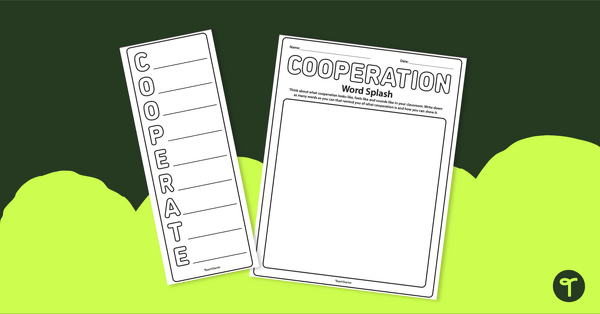
Cooperation Word Splash and Acrostic Poem
Discuss cooperation with your students and write an acrostic poem wih a printable word splash worksheet and poem template.
- Plus Plan
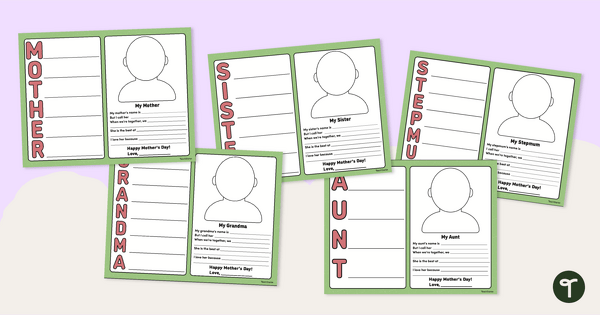
Mother's Day Acrostic Poem
Create a special keepsake for mum, grandma, aunt, or another special lady with a Mother’s Day acrostic poem template.
- Plus Plan
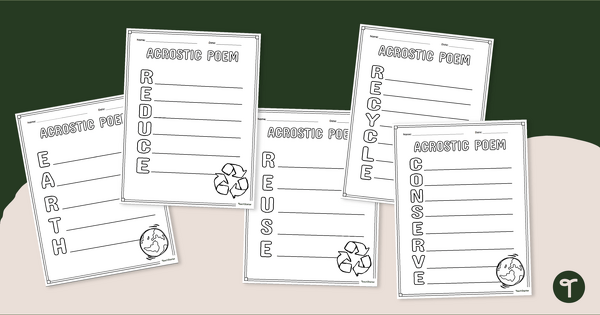
Earth Day - Acrostic Poem Template Pack
An acrostic poem template to use in the classroom to celebrate Earth Day and National Poetry Month.
- Plus Plan
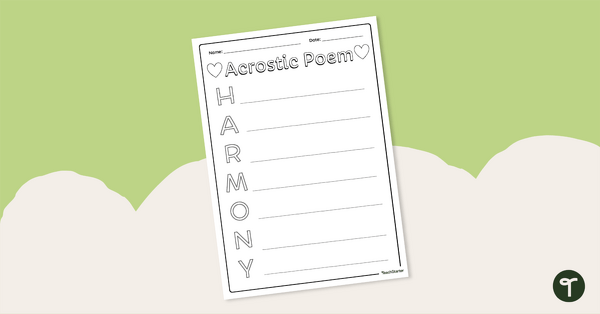
Harmony Acrostic Poem Template
Print an acrostic poem template for kids to celebrate Harmony Day or Harmony Week in your classroom.
- Plus Plan
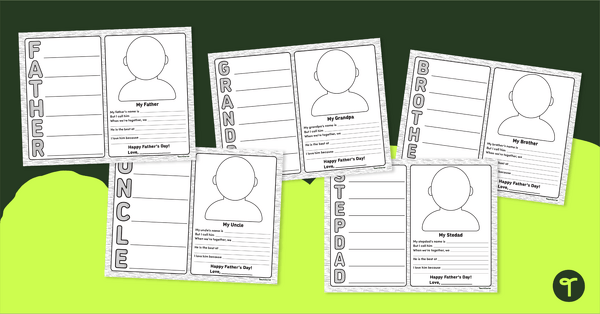
Father's Day Acrostic Poem Worksheet
Create a special keepsake for dad, grandpa, uncle or another special father figure with this Father’s Day acrostic poem template.
- Plus Plan
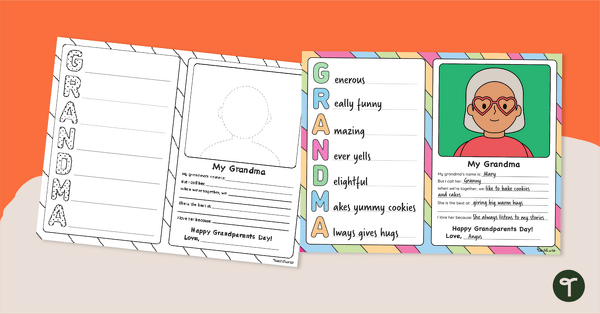
Grandparents Day Acrostic Poems
Celebrate grandma and grandpa in the classroom with a Grandparents Day acrostic poem template.
- Plus Plan
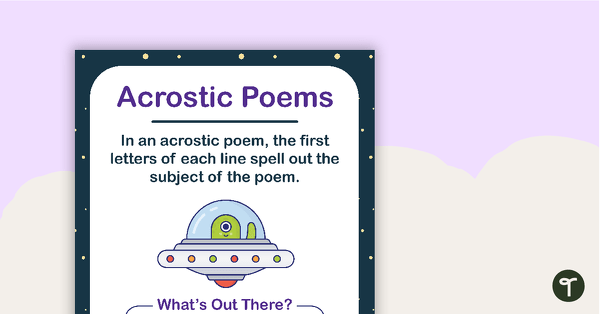
Acrostic Poems Poster and Templates
Use this acrostic poem example and accompanying templates to teach your students how to write an acrostic poem.
- Free Plan
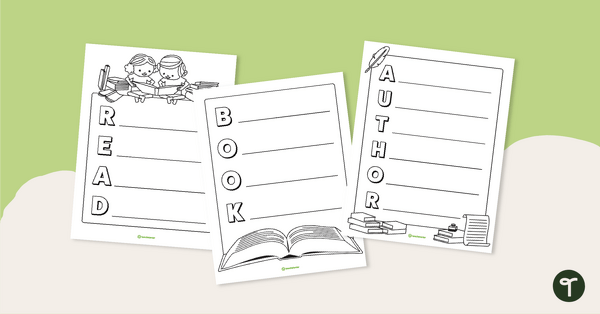
Reading Acrostic Poems – Templates
A set of 7 acrostic poem templates.
- Plus Plan
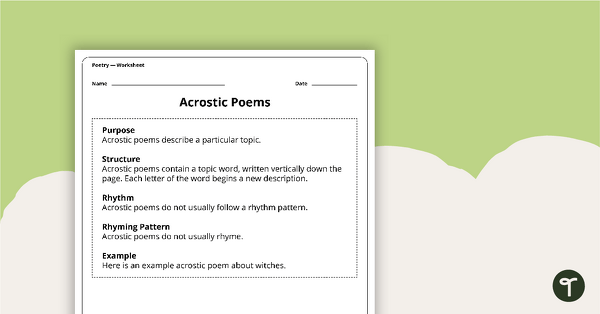
Write an Acrostic Poem Worksheet
Set your students up for success when writing an acrostic poem with this set of scaffolded, easy-to-follow worksheets.
- Plus Plan
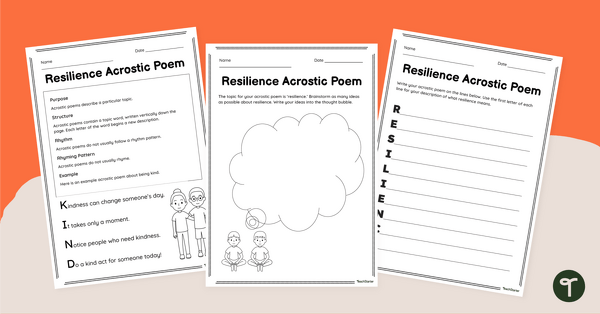
Resilience Acrostic Poem Worksheet
Have students write a resilience poem to help them understand the meaning of this crucial social-emotional skill.